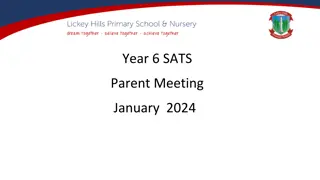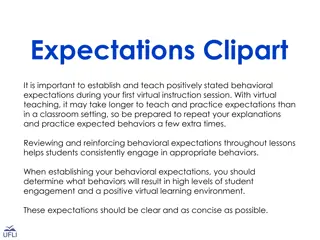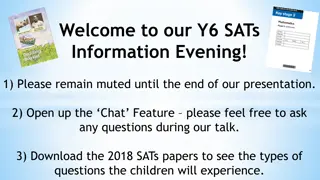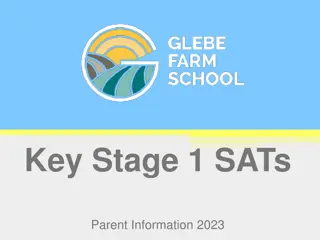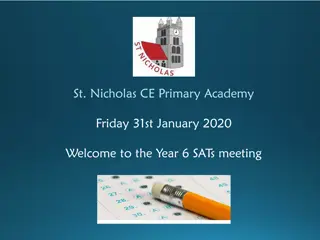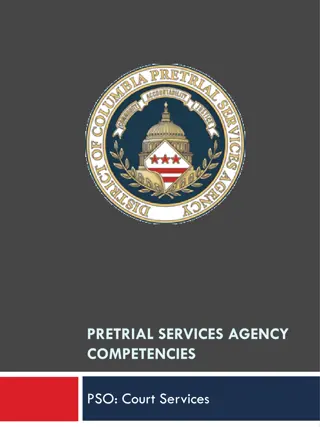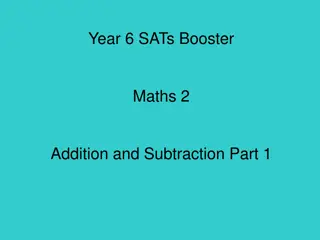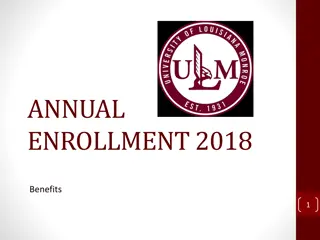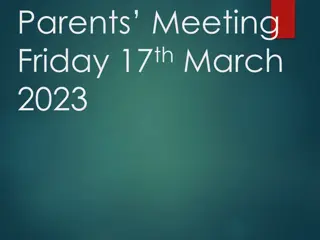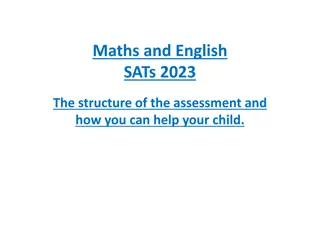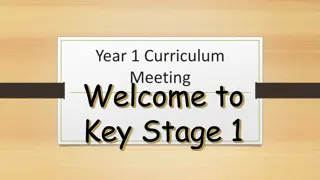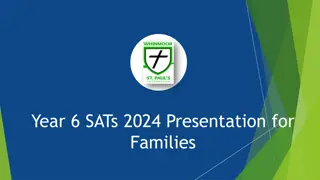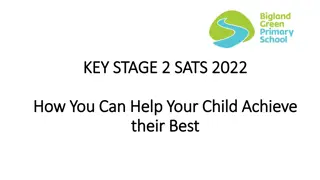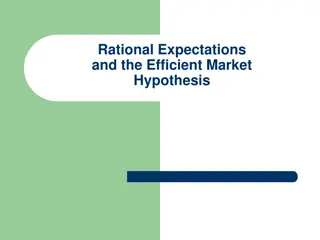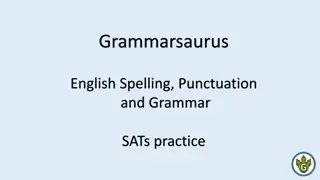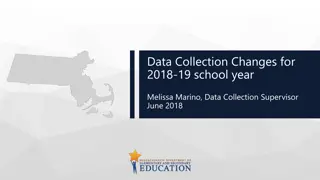Key Stage 2 SATs Changes and Expectations 2018/19 Overview
Changes in Key Stage 2 SATs including the introduction of a new national curriculum framework, abolition of old national curriculum levels, and transition to scaled scores. Parents can expect their child’s test results to be reported in scaled scores, with 100 representing the national standard. The summary also explains how scaled scores reflect children's performance against age-related expectations (ARE) and highlights the new expectations for higher-attaining pupils in the Key Stage 2 assessments.
Download Presentation

Please find below an Image/Link to download the presentation.
The content on the website is provided AS IS for your information and personal use only. It may not be sold, licensed, or shared on other websites without obtaining consent from the author. Download presentation by click this link. If you encounter any issues during the download, it is possible that the publisher has removed the file from their server.
E N D
Presentation Transcript
Key Stage 2 SATs Parents Workshop 2018 Information and Guidance on the Changes and Expectations for 2018/19
Key Stage 2 SATs Changes In 2014/15 a new national curriculum framework was introduced by the government for Years 1, 3, 4 and 5 From 2015/16 children in all years at Key Stage 1 and 2 are expected to study the new national curriculum. KS1 (Year 2) and KS2 SATs (Year 6) will reflect the new curriculum for the fourth time this year. As your child is in Year 6 this year, they will be the fourth pupils to receive the new tests and receive the new style of reporting results.
Assessment and Reporting Old national curriculum levels (e.g. Level 3, 4, 5) have now been abolished, as set out in the government guidelines. From 2016, test scores have been reported as scaled scores . This means it is very difficult to compare the assessment of the current year with their Key Stage 1 attainment. Your child will still be taught with the highest expectations and cover all required elements of the curriculum, similar to previous years. The new curriculum is more rigorous and sets high expectations which all schools have had to work hard to meet for several years.
Scaled Scores 100 will always represent the national standard . Each pupil s raw test score will therefore be converted into a score on the scale, either at, above or below 100. The scale will have a lower end point somewhere below 100 and an upper end point above 100. A child who achieves the national standard (a score of 100) will be judged to have demonstrated sufficient knowledge in the areas assessed by the tests. In July 2019, each pupil will receive: A raw score (number of raw marks awarded). A scaled score in each tested subject. Confirmation of whether or not they attained the national standard.
Scaled Score Examples On publication of the test results in July 2019: A child awarded a scaled score of 100 is judged to have met the national standard in the area judged by the test. This is commonly referred to as ARE (Age Related Expectations) A child awarded a scaled score of more than 100 is judged to have exceeded the national standard and demonstrated a higher than expected knowledge of the curriculum for their age. This is also commonly referred to as ARE (Age Related Expectations) A scaled score of 110+ indicates the child has scored highly and has grasped the age-related expectations in greater depth. This is commonly referred to as GDS (greater depth). A child awarded a scaled score of less than 100 is judged to have not yet met the national standard and performed below expectation for their age. This is commonly referred to as WTS (working towards the standard).
Higher Attaining Pupils Previous Key Stage 2 tests were aimed at children achieving Levels 3-5 (with a national expectation to reach at least Level 4) In the past, additional Level 6 tests were produced for children who demonstrated higher than expected attainment, above Level 5. As in the previous two years, there won t be any separate tests for the most able children. Instead, each test will have scope for higher attaining pupils to show their strengths. A score of 110+ would indicate a higher attaining pupil.
The Tests Key Stage 2 SATs take place nationally in the week commencing 13th May 2019. Statutory tests will be administered in the following subjects: SPaG Reading (60 minutes) Mathematics Paper 1: Arithmetic (30 minutes) Paper 2: Reasoning (40 minutes) Paper 3: Reasoning (40 minutes) Punctuation, Vocabulary and Grammar (45 minutes) Spelling (approximately 15 minutes)
The Tests (continued) In addition, some schools will be required to take part in Science testing, consisting of three tests in Biology, Physics and Chemistry. Not all schools will take part in this sampling, which takes place on a later date. All tests are externally marked. Writing will be Teacher Assessed internally, as in recent years.
The Tests What score is needed? Reading SPaG Mathematics 0-27 - WTS (SS<100) 0-37 - WTS (SS<100) 0-50 - WTS (SS<100) 28-39 ARE (SS 100>109) 38-55 ARE (SS 100>109 61-95 ARE (SS 100>109 40 50 - GDS (SS>110) 56 70 - GDS (SS>110) 96-120 - GDS (SS>110) WTS = Working towards expected standard ARE = Age related expectation GDS = Greater depth standard SS = Scaled score
How to Help Your Child First and foremost, support and reassure your child that there is nothing to worry about and they should always just try their best. Praise and encourage! Ensure your child has the best possible attendance at school. Support your child with any homework tasks. Reading, spelling and arithmetic (e.g. times tables) are always good to practise. Talk to your child about what they have learnt at school and what book(s) they are reading (the character, the plot, their opinion). Make sure your child has a good sleep and healthy breakfast every morning! Use CGP books to help children build confidence and refresh skills. Read different texts at home for pleasure, sometimes for extended periods of time.




